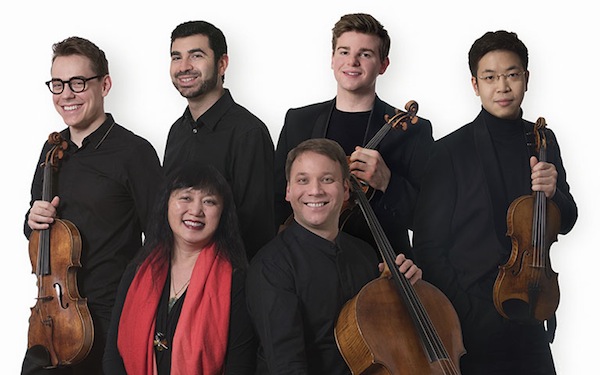The more players the merrier with Chamber Music Society
It was yet another bone-chilling night in Chicago and one that clearly impacted turnout for the concert by the Chamber Music Society of Lincoln Center. The Harris Theater looked to be about a third full on Wednesday, far below the usual audience numbers for this series.
While not everything was successful in the way one routinely expects from artists of this caliber, the program of Brahms and Dvořák provided sufficient rewards to warm the bleak midwinter.
The pairing of Johannes Brahms and Antonin Dvořák was an apt and felicitous one. Brahms provided consistent professional aid to his Czech colleague, including recommending Dvořák to his publisher and even offering to proofread his scores. For his part, Dvořák was amazed and grateful for this generosity, even if the gentle Roman Catholic could never quite fathom Brahms’ religious skepticism.
Two near-contemporaneous works from each composer made up the bulk of the program with Brahms’s Piano Trio in C minor up first. This third and final essay in the genre is a late work, and darker and more turbulent than many that came in the last decade of the composer’s life.
The forceful playing of violinist Paul Huang, cellist Dmitri Atapine and pianist Michael Brown were surely in synch with the sturm und drang that dominates the opening movement of Op.101. Atapine also brought burnished cello tone to the ensuing second subject, the three players blending fluently together.
Yet as the reading unfolded, one couldn’t help hearing a certain generalized approach and a lack of expressive nuance–feeling more like a promising early rehearsal than a finished performance. The middle movements were especially under-characterized: the overloud Presto missed the nervous, feather-light delicacy alluded to in the program notes, and the short-breathed Andante lacked an essential tender intimacy. The finale brought worthy energy and a fiery coda, but overall this was an uneven, intermittently prosaic Brahms outing.
There was nothing prosaic about the performance of Dvořák’s Piano Quintet No. 2 in A major that concluded the evening.
Brahms once remarked that other composers could go for years on the shavings from Dvořák’s workbench. That thematic abundance is manifest in his Second Piano Quintet, which is among his finest chamber works—artfully varied and balanced among the five instruments with a Mozart-like profusion of melody.
Wu Han was at the piano and proved the ebullient fulcrum of this lively performance, joined by four young colleagues: violinists Chad Hoopes and Huang, violist Matthew Lipman and cellist Atapine.
Whereas the Brahms Trio felt like a work in progress, this Dvořák performance was the real thing—committed and dynamic from the get-go with a true ensemble feeling. The varied musical personalities of each player were delightfully evident yet with the unit always twining together as a cohesive and dedicated whole.
Rarely will one hear this work’s dramatic vigor and folk-like qualities so vividly conveyed while held in such a dexterous balance. In the first violin chair, Hoopes was particularly impressive, bringing an ingratiating sweet tone to Dvořák’s lyrical passages yet tossing off the breakout moments with understated bravura.
It didn’t seem that long ago that Matthew Lipman was making his professional debut with Ars Viva. Clearly the young Chicago-area native is living up to the high expectations in his burgeoning career. The viola was Dvořák’s own instrument and in the Dumka movement, Lipman’s refined tone and sensitive phrasing conveyed the rustic flavor naturally without special pleading. All the players charted the movements’s mercurial mood-swings with equal aplomb.
The ensuing Furiant went with requisite vivacity without sacrificing an essential amiability. Perhaps the finale’s running figurations are marginally less inspired then the quintet’s preceding movements, but the musicians brought out the fizzing exuberance and finessed the steep tempo fluctuations with consummate skill and rich musicality.
Like the two main works, the piano duets that opened each half proved a mixed bag.
Brown and Wu Han led off the evening with four of Dvořák’s Slavonic Dances. Yet while played with aggressive energy, the music’s essential charm was largely missing in action. The B minor dance (Op. 72, no. 1) came off better but there was little detailing or varied dynamics. Though it was less noticeable in the chamber works, the Steinway’s harsh, shallow tone didn’t help matters.
The pianists switched places for three of Brahms’s Hungarian Dances after intermission with Wu Han taking the first part. Though the playing was less polished technically, the performances were more communicative. The F minor Poco sostenuto went with enviable verve and the pianists put across the quirky humor of the Allegretto in A major with a light touch.
The next Chamber Music Society of Lincoln Center concert takes place 7:30 p.m. February 28. The program, “From Vienna to Hollywood” will include Schubert’s Fantasie in F minor for Piano, Four Hands, and Fantasy in C major for Violin and Piano, along with Korngold’s Suite for Piano Left Hand, Two Violins, and Cello. harristheaterchicago.org.
Posted in Performances





